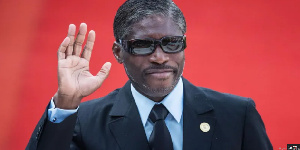- Home - News
- Polls
- Year In Review
- News Archive
- Crime & Punishment
- Politics
- Regional
- Editorial
- Health
- Ghanaians Abroad
- Tabloid
- Africa
- Religion
- Election 2020
- Coronavirus
- Photo Archives
- News Headlines
- Press Release
General News of Friday, 10 July 2020
Source: 3news.com
Occupyghana calls for the immediate recall of A-G Domelevo from leave
Pressure group Occupy Ghana has demanded the immediate reversal of the decision by President Nana Addo Dankwa Akufo-Addo to ask Auditor-General Daniel Yaw Domelevo to proceed on his accumulated leave.
The issue has degenerated into a legal tussle between the Presidency and Mr Domelevo.
While the Presidency is convinced the law backs its directive for the Auditor-General to go on leave, Mr Domelevo believes Mr Akufo-Addo’s decision may have been taken out of bad faith as his work, he believes, may be “embarrassing” the government.
Pressure group Occupy Ghana has waded into the issue, bemoaning the hitherto rosy relationship between Mr Domelevo and the current government is on the brink of being marred by this decision.
“When the history of the office of the Auditor-General is written, the appointment (and even the timing and circumstances of it), the work of the current Auditor-General and the phenomenal financial and other support that this government gave to his office, should be what are highlighted,” it said in a statement on Friday, July 10.
“That story should not end with a final paragraph that says in the twilight of his public service, the Auditor-General was subjected to an unconstitutional removal from office dressed up as an enforced accumulated leave.”
The group has asked the Council of State to intervene in this delicate matter.
Find the full statement below:
OCCUPYGHANA® PRESS STATEMENT
Occupyghana® calls for the immediate recall Domelevo from leave
OccupyGhana® has observed with great disquiet the circumstances leading to and following the President’s directive to the Auditor-General to proceed on an ‘accumulated leave.’ We find it difficult reconciling that directive with the constitutional injunction under which in the performance of his functions, which necessarily includes the mundane matter of whether, when and how he takes his leave, the Auditor-General is insulated from the ‘direction and control of any person or authority.’
While it may be best industrial, governance and management practice for every worker, including the Auditor-General, to take an annual leave, we think the constitutional insulation of that office is clear and leaves no room for any penumbra within which the presidential directive may operate. Even if there was, which we dispute, the circumstances of this matter should have given the Executive a great opportunity for exercising restraint of power and the development of the constitutional check and balances inherent in the creation and protection of independent constitutional bodies.
Ours is still a nascent democracy that requires all of us to assist in upholding the independence of constitutionally protected bodies such as the Auditor-General, the Electoral Commission, CHRAJ and the Judiciary. Ghana would be the ultimate loser if presidential power is deployed to micromanage any of these independent constitutional bodies, contrary to the express terms of the Constitution.
We also believe that this matter ought to be resolved by the Council of State in a manner that upholds restraint of power and errs on the side of the development of the constitutional check and balances inherent in the creation and protection of the independent constitutional bodies. Leave Is a Constitutional Right
First, leave is a constitutional right, and not a statutory obligation. With respect to the Auditor-General, article 187(12) of the Constitution specifically mentions, recognises and protects ‘his rights in respect of leave of absence.’ These words are repeated verbatim in section 10(7) of the Audit Service Act.
The leave entitlement of the Auditor-General is part of the terms and conditions of his office, expected to be provided under article 71 of the Constitution. Under that article, the ‘facilities and privileges’ of the Auditor-General (which definitely includes ‘his rights in respect of leave of absence’) is first recommended by the relevant Article 71 Committee and then determined by the President, acting in accordance with the Council of State’s advice.
From our checks, the relevant and applicable Article 71 Committee Report is the Edu-Boandoh Report of August 2016, which was to apply for 2013 to 2017 but has continued in operation because there is no other, current Report. Our review of that document shows that it contains no provision on the Auditor-Generals’ leave entitlement.
To compound matters, the whopping 40-day leave provided under the Conditions Of Service For Management Staff of the Audit Service dated 30 July 2008 (extended by the reported practice that adds 4 days of ‘travel time’ to annual leave periods for some public officers) does not apply to the Auditor-General. That document, prepared by the Board of the Audit Service under article 189(3) of the Constitution states expressly as follows: ‘These Conditions of Service…shall apply to the Management Staff of the Audit Service (Deputy Auditors-General, Assistant Auditors-General and Directors) other than the Auditor-General.’
In this situation, all that an Auditor-General is assured of, is the minimum 15 days entitlement provided for under section 20 of the Labour Act. Further, and with respect to leave being a right and not an obligation, article 24(2) of the Constitution assures all workers of ‘rest, leisure and reasonable limitation of working hours and periods of holidays with pay, as well as remuneration for public holidays.’ These are assurances, not obligations. Thus, if a worker may voluntarily opt to work beyond the normal ‘limitation of working hours,’ then that worker does nothing wrong in deciding to take less or even no ‘periods of holidays with pay,’ however personally unhealthy that might be.
That is why section 31 of the Labour Act cannot be interpreted or applied to convert the constitutional right into its exact opposite, a statutory obligation. Such an interpretation or application is not only unconstitutional, but does violence to the internal harmony of the Labour Act itself, section 20 of which aligns with the position of the superior provisions of the Constitution, that leave is a right.
While we may debate the propriety or otherwise of not taking one’s leave entitlement, and also debate the meaning of the outlawing of an ‘agreement’ to relinquish or forgo leave under section 31 of the Labour Act, whichever meaning is applied cannot turn or flip the constitutional right on its head into a statutory obligation.
Thus, we respectfully think that the singling out of the Auditor-General and applying leave to him as an obligation is a grave error and a regrettable unconstitutional act.
Our worries got even exacerbated when the presidency purported to direct the Auditor-General to also proceed on his 2020, largely unearned leave when 2020 is only about halfway through. While that directive is also unconstitutional by itself, in our view, it also breaches section 20 of the same Labour Act that the presidency relies upon, which speaks of the right to leave being ‘in any calendar year of continuous service.’
2020 is not over and every worker, subject to arrangements with the employer, technically has until the last 15 days of the year (the minimum statutory period of leave) to exercise that right. The presidency’s direction to the Auditor-General to take his 2020 leave literally in the middle of the year, could become a bad precedent that can only harm our constitutional development.
We are further alarmed at the purported reliance on some previous direction to another Auditor-General to proceed on accumulated leave. We are convinced that that alleged administrative precedent was illegal and unconstitutional, and that the quiet compliance with, and failure, refusal or neglect of the affected person then to challenge it (reminiscent of the period where successive Auditors-General were too scared to even exercise their constitutional disallowance and surcharge powers), does not convert that illegality and unconstitutionality into a much-desired precedent, worthy of being followed.
We are certainly not convinced by the purported reliance on the decision of the Court of Appeal in Adrah v ECG. That decision was simply that an employer could not provide for commuting leave into cash in its Staff Manual and then assert in court that that was illegal. Dzamefe JA characteristically did not mince his words. He said ‘ECG cannot play hot and cold at the same time… It is contradictory. The company’s negligence and mistakes cannot be visited on the innocent employee.’
In his detailed concurring opinion, Ofoe JA spent considerable time to analyse and interpret section 31 of the Labour Act and held that what that section did was to deny the worker the right to sell his leave and prevent the employer from buying that leave. However, based on the specific facts of the matter, he held that in equity, it would be unconscionable, grossly unfair, manifestly unjust and fraudulent to allow ECG to rely on this section of the Act. He would not allow ECG to use the law as an engine of fraud and therefore held that it is not every agreement to forgo leave that is void and for which accumulated leave yields no benefits for the worker.
Thus, throughout this unanimous decision, the Court was careful to uphold the fact that leave is an entitlement to the worker. For section 31 to apply, it held, there must be an agreement to sell the leave. That is what was outlawed. This case did not provide any general support to compelling any worker to go on so-called accumulated leave.
What the case rather establishes is that section 31, on which the entire presidential direction appears to be based, outlaws agreements to sell or purchase leave. Thus, where the worker fails or neglects to take or commence leave in the calendar year the worker loses the leave days and cannot be paid for it, unless the court finds grounds to the contrary.
We must also comment on the eye-popping leave entitlement of some public officials. 44 working days of leave, in addition to the 13 days of public holidays, means that for three months in each year, these public official enjoy leisure and rest, while being paid by the tax payer. It is time to begin a national debate on whether it is right at out stage of development when hard work is what is required, for public officials to work for just three-quarters of a year, and to enjoy paid rest for one-quarter of the year.
The reality, we know, is that several public officials never took the full leave entitlement. The simply sold it back to us and we paid for it. This is what section 31 seeks to prevent, according to the Court of Appeal in Adrah v ECG.
Thus, neither the purported administrative precedent nor purported judicial precedent is applicable or of any relevance to this matter. We should also look beyond the immediate and be concerned about why at least two Auditors-General have been reluctant to take their full leave entitlements, and the role that the Board of the Audit Service plays in all of these matters.
Independence of the Auditor-General
The Constitution vests in the Ghanaian presidency, some of the most immense powers in any democracy on earth. The President is the repository and embodiment of executive power and authority, and gets to appoint almost every actor in the public service.
But having vested such immense powers in the President, the Constitution puts in place certain checks and balances that, hopefully, would restrain the exercise of those powers and not leave Ghana with the oxymoron or contradiction of a democratic, constitutional dictatorship to replace the dictatorship that we quietly rejected and overthrew when we voted to enact this Constitution at a national referendum held throughout Ghana on the 28 April 1992.
One way in which the Constitution checks presidential power is the creation of independent constitutional bodies or offices. Although the President appoints persons to those bodies or offices, the President has and exercises absolutely no power over them after they are appointed. As hard as that may be to accept, the President has no political, executive, administrative, financial or even disciplinary power over those offices.
Those bodies or offices are the Electoral Commission, CHRAJ, NCCE, National Media Commission, Public Services Commission, Lands Commission, and of course the Auditor-General. By the use of the radical and mandatory words ‘shall not be subject to the direction or control of any person or authority,’ the Constitution insulates these from being subjected to any other entity, including the Executive and Parliament. The only other body with similar insulation is the Judiciary.
Yet the Constitution did not seek to constitute those offices into demi-gods. It therefore subjects them and their operations to the Constitution and the law, by providing specific, limited instances for calling them to order, such as articles 23, 33, 295(8) and 296 of the Constitution.
That is why in the 25 June 2020 ruling of the Supreme Court in NDC v AG & EC (Consolidated), the Court felt constrained to refer to and reiterate its 2016 decision in Abu Ramadan & Gary Nimako v EC (No 2), that an independent body such as the EC in the exercise of its functions, ‘cannot be compelled to act in a particular manner unless there is clear evidence that they have acted unconstitutionally,’ and that it was ‘necessary to keep the Court itself within its proper limits in order to give effect to the supremacy of the law.’ We commend this exemplary exercise of restraint of power, to the Executive and Legislature in their dealings with these bodies.
This constitutional architecture that restrains even the highest court of the land from giving directions to or exercising control over these bodies, in the absence of any evidence of unconstitutionality, is deliberate. These bodies are expected to counter-balance and check the power of, and stand up to, all other persons or authorities, if need be. Thus our Constitution does recognises not just the traditional three branches of power, but carves out and ring fences another branch, composed by the independent constitutional bodies, essential watchdog bodies, and insulates them from any control. By this, the Constitution anticipates and expects ‘healthy tension’ between these bodies and other persons and authorities, and therefore protects the former from the whims and caprices of the latter, in the expectation that out of that ‘equilibrium of tension,’ (to borrow from Nixon v Sirica) Ghanaians would be protected from oppression.
Separation of powers is ‘not to promote efficiency but to preclude the exercise of arbitrary power. The purpose was not to avoid friction, but by means of the inevitable friction incident to the distribution of the governmental powers… to save the people from autocracy’ (Myers v United States.)
This is the state of the unique separation within even executive power, meant to hold the otherwise super-powerful executive presidency in check. Thus, although the occupants of the independent office are public officers appointed by the President, the latter shall not direct and control them in any manner whatsoever.
Therefore, the argument from the presidency, that article 297(a) subjects these bodies to the President’s disciplinary control simply on account of his having appointed them is implausible, is untenable and drives a fleet of Ayalolo buses through the carefully constructed constitutional architecture meant to prevent just that.
The fact that a past President breached that constitutional architecture and got away with it, sets a bad precedent. Bad precedents are not followed. Bad precedents are not justified. If this is not checked and rolled back immediately, we will be setting further bad precedents that will eventually erode the precious little constitutional checks on executive power that exist.
Entertainment

Bawumia’s $80 bn market value claim for Spotify, false!
Opinions







